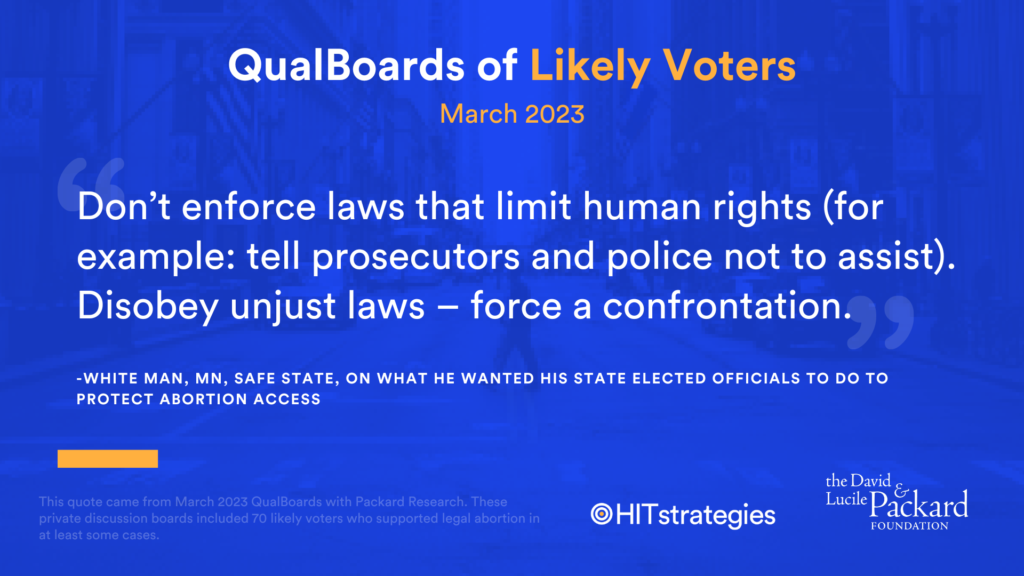New Online Focus Groups: Voters Explain What They Want Their Representatives to Do in Response to Latest Restrictions on Abortion Access, Including Medication Abortion Lawsuit
-
TYPE:
Press Release -
AUDIENCE:
Reproductive Justice
Washington, D.C. | May 17 – A new study from HIT Strategies and the Packard Foundation reveals how voters respond to threats to abortion access after the recent abortion restrictions. HIT and Packard conducted qualboards (online group discussions) in March with 70 likely voters who support legal abortion in some cases. During the forums, many voters didn’t know about the new threats to abortion rights, but when informed, many reacted strongly. The voters also shared their views on what they want their elected officials to do to protect abortion rights and their vision for a future where abortion is legal and economically accessible.
“Though many voters are unaware of post-Dobbs attacks on abortion rights, this research shows that information is mobilization,” said Roshni Nedungadi, founding partner at HIT Strategies. “Education on these new threats, including the lawsuit to restrict access to medication abortion, energizes the abortion rights majority—many of whom want to see a future where abortion is not only legal but also readily accessible.”

Key Takeaways
- Voters may not be aware of recent threats to abortion rights.
- When given information about these abortion attacks, voters felt strongly and were motivated to take action.
- Voters want their state elected officials to take a stand and fight back against these attacks on abortion rights.
- Voters envisioned an ideal future where not only is abortion legal but also affordable and accessible to all.
| Voters QualBoards Commentary |
| “I’ve not heard anything recently, the press surrounding abortion and its proceedings has pretty much died down. I don’t know if it’s because I don’t subscribe to a lot of those outlets, but I haven’t seen much.” Black man, MO, restrictive state |
| “I feel extremely angry and in disbelief that something like this is even considered” – AAPI woman, AK, Safe state, on medication abortion lawsuit. |
| “Plan B and the like.” – White man, AZ, Restrictive state, on the definition of medication abortion |
“I have only heard positive things; I believe this is a good alternative.” – White woman, TN, Restrictive state, on what she’s heard about medication abortion. |
| “I’ll talk to my family and friends about this. It’s very concerning.” – White man, CA, Safe state, on what he’ll do in reaction to medication abortion lawsuit. |
| “People would riot and likely create chaos in the street… It’s important to the people in my community, so there will be a great deal of marching, protesting and unrest.” – Black man, MO, restrictive state, on potential national abortion ban |
| “I would expect them to try to push legislation to protect a women’s right to choice and fight against any opposition to that.” – white woman, TX, restrictive state, on what she wanted her state elected officials to do to protect abortion access |
| “Don’t enforce laws that limit human rights (for example: tell prosecutors and police not to assist). Disobey unjust laws – force a confrontation.” – white man, MN, safe state, on what he wanted his state elected officials to do to protect abortion access |
| “Abortion access to all covered by health insurance and, more importantly, take government out of this choice.” – White woman, TN, Restrictive state, on her ideal future for abortion |
| “Just complete access to abortion without any stigma or legal/financial barriers” – AAPI woman, AK, safe state, on her ideal future for abortion |
| “This will hurt all the women nationwide who are either considering abortion or are in that process of having an abortion. These women have nowhere to turn to.” – Black woman, MS, Restrictive state, on mifepristone lawsuit |
| “We would fight to keep abortion legal in my state. It would just lead to greater battles. If they did that, it would be a fight for the fate of the nation.” – Black man, MD, Safe state. |
| “I’ve not heard anything recently, the press surrounding abortion and its proceedings has pretty much died down. I don’t know if it’s because I don’t subscribe to a lot of those outlets, but I haven’t seen much.” – Black man, MO, restrictive state |
With substantial evidence showing the mobilizing effect of abortion restrictions, HIT recently released a memo with tactical and messaging recommendations for campaigns to center the issue of abortion in 2024.
About HIT Strategies
As Washington’s leading millennial and minority-owned public opinion research company, HIT Strategies helps leaders and organizations translate their target audiences’ values into real-time insights. We understand America’s fastest-growing electorate and consumer groups and specialize in targeting communities under-represented in public opinion data, including Black Americans, Latino Americans, Millennials + Genz, LGBTQ+, Women, Asian Americans, and Pacific Islanders. For more information, visit hitstrat.com and follow @HITStrat on Twitter, Facebook, and Instagram.
###
